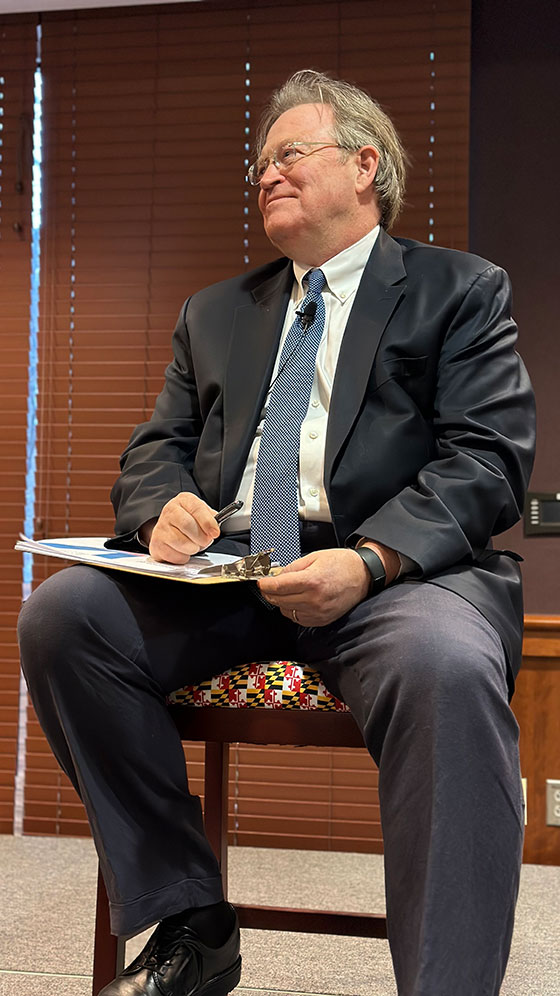 Climate change, structural drags on the global economy, data privacy, artificial intelligence and a potential nuclear renaissance. These are the major trends that will inevitably shape the future over the next five years, says Erik Peterson, partner and managing director at Kearney.
Climate change, structural drags on the global economy, data privacy, artificial intelligence and a potential nuclear renaissance. These are the major trends that will inevitably shape the future over the next five years, says Erik Peterson, partner and managing director at Kearney.
Reflecting on Kearney’s recent Global Trends Report, Peterson encouraged students to look beyond today’s headlines and offered insights to help them successfully navigate the business operating environment set to be impacted by these trends during the Distinguished Speakers in International Business Series (DSS) hosted by the Center for Global Business at the University of Maryland’s Robert H. Smith School of Business on Monday, Feb. 6, 2023.
“Business leaders need to cover their immediate issues every single day,” said Peterson. “But the real authentic strategic leaders among them have the capacity to be looking way ahead and positioning themselves, their organizations and their cultures.”
During last year’s discussion, Peterson highlighted quantum computing, rises in water dislocation and the increasing prevalence of central bank digital currencies (CBDCs). Of those, water dislocation remained a part of this year’s conversation on climate change, which Peterson said was one troubling sign among issues of soil erosion, desertification and others.
What is encouraging, however, is the amount of consideration and financial commitment toward combating climate change, especially as it pertains to environmental, social and governance (ESG) investments.
“I can tell you as a management consultant these days if you're not thinking hard about ESG then you're going to be left behind,” said Peterson. “The fact of the matter is that Kearney and all of our competitors are working hard now to take the high ground in this space, and the same is true with countries.”
The direction of the global economy is quite uncertain as well. According to the IMF World Economic Outlook, from the beginning of the century to 2019 the average economic growth was roughly 3.8%, signifying potential economic drags heading into the future.
More recent data from the Federal Reserve reflects some optimism moving forward with inflation coming down. According to Peterson,“, we may see inflation drop down to 4.3% from 6.6% this year.”
Those economic trends are extremely important to watch, especially as the world continues its shift into a global data economy. Data privacy laws will become even more relevant and those changes stand to impact businesses at every level.
“Companies really need to be extraordinarily careful in how they move, mine, process and manipulate data. Otherwise, governments across the world are going to constrain their capacity to maneuver the future. Already many of these companies have become so extraordinarily large that they'll be difficult to kind of turn back.”
Peterson thinks there’s a whole separate conversation to be had about the transition to nuclear power as an alternative to fossil fuels. With nuclear reactors becoming smaller and safer, the global nuclear power market is expected to grow roughly 1.5% per year and will be driven in particular by advances in emerging markets. Installed production is expected to increase by 10% from current levels only by the year 2027.
“All of these trends will occur in a period of ‘post-truth,’” said Peterson, “where next-generation deep fakes and artificial intelligence will create significant turbulence for corporations and governments alike.” Citing the 2022 Edelman Trust Barometer, Peterson shared that concerns over fake news or false information being used as a weapon are now at an all-time high of 76%.
“What we're seeing now is that a public that already doesn't trust the institutions around it now can't believe its own eyes. What happens when, in effect, you can't even believe what you think you see on TV?”
He said with these grand challenges, comes the potential to enact positive change, and students must now begin thinking of how they will seize that potential.
“It's not all positive to be sure, but in the end, we've always had a constellation of challenges. Even though these are different challenges from the ones that we've encountered in the past, we can do it.”
The event was supported in part by CIBE, a Title VI grant administered by the U.S. Department of Education.
Media Contact
Greg Muraski
Media Relations Manager
301-405-5283
301-892-0973 Mobile
gmuraski@umd.edu
About the University of Maryland's Robert H. Smith School of Business
The Robert H. Smith School of Business is an internationally recognized leader in management education and research. One of 12 colleges and schools at the University of Maryland, College Park, the Smith School offers undergraduate, full-time and flex MBA, executive MBA, online MBA, business master’s, PhD and executive education programs, as well as outreach services to the corporate community. The school offers its degree, custom and certification programs in learning locations in North America and Asia.